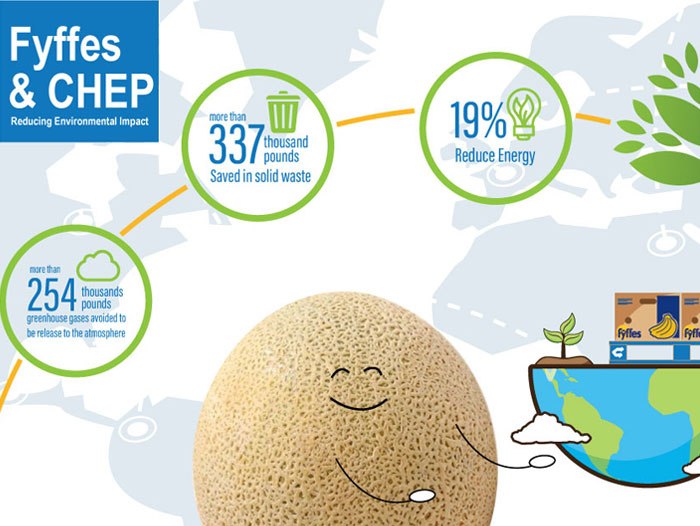Fyffes Achieves 100% Use of Recycled Pallets in the Transportation of Melons
January 7, 2020 | 3 min to read

CORAL GABLES –At Fyffes we want to do our bit to contribute to a more sustainable future, and we are proud to have achieved a major milestone in our efforts. Last season, 100% of Fyffes melons were transported in shareable and reusable wood pallets, a significant contribution towards a circular economy. With the new 2019/2020 melon season underway, Fyffes continues to use reusable pallets in its melon operations while expanding its use across its other products.
Over the past decade Fyffes has significantly reduced its carbon footprint through different initiatives that support the first pillar of Fyffes global Sustainability Strategy – Stewardship for the Planet. One of these initiatives is the use of shareable and reusable pallets to transport millions of boxes of Fyffes fruit worldwide, through a partnership with CHEP (Commonwealth Handling Equipment Pool). As a result of this ongoing partnership, all of Fyffes melons were transported in CHEP pallets during the 2018-2019 off-shore season, and their use in transporting bananas is increasing as well.
Studies show shared and reusable wood pallets have the lowest environmental impact compared with limited-use and plastic pallets: a circular solution allow for reutilization, transport and resource efficiencies resulting in major sustainability savings. In 2018 alone Fyffes saved 337 thousand pounds (153 thousand kg) of solid waste, reduced energy usage by 19%, and avoided 254,406 pounds (115,397 kg) of greenhouse gases being released into the atmosphere. This is equivalent to 1,038 cubic yards (794 cubic meters) of landfill space, 1,259 barrels of oil, and 10,966 trees planted and grown for 10 years.
Erick Pinot, Commercial Director of Mexico and General Manager in Central America for CHEP, says “We feel proud to partner with Fyffes and share our commitment to make the world a better place through the circular economy that these pallets offer. This provides the benefit of acquiring a sustainable product in a society that is engaged with the planet now more than ever.”
Julie Cournoyer, Fyffes Global Director of Sustainability also commented on the strategic partnership with CHEP: “At Fyffes we align our sustainability approach to the United Nations Sustainable Development Goals (SDGs). This partnership helps Fyffes improve on SDG 12 – ‘Responsible Consumption and Production’ as well as SDG 13 – ‘Climate Action’”, two key sustainability goals for Fyffes.
CHEP evolved from the Allied Materials Handling Standing Committee in post-World War II in Australia, where millions of US Army blue pallets were left behind at their military bases. Today, CHEP has operations in 59 countries and has a pool of approximately 300 million pallets and containers, generally recognized by their distinctive blue paint color.
About Fyffes
Fyffes is one of the largest and oldest tropical produce importers and distributors. With an infrastructure that reaches across the globe, Fyffes is truly an international player, involved in the production, procurement, shipping, ripening, distribution and marketing of bananas, pineapples, melons and more recently mushrooms. Since 1888, Fyffes has been committed to bringing the world the highest quality products, inspiring people to feel excitement about our brands and making a positive difference for our growers and farmers, our customers and the environment. Today, Fyffes is the largest importer of bananas in Europe and the No. 1 importer of off-shore melons in North America. In addition to tropical fruit, Fyffes is the third largest producer of mushrooms in North America. Discover more at Fyffes.com.
